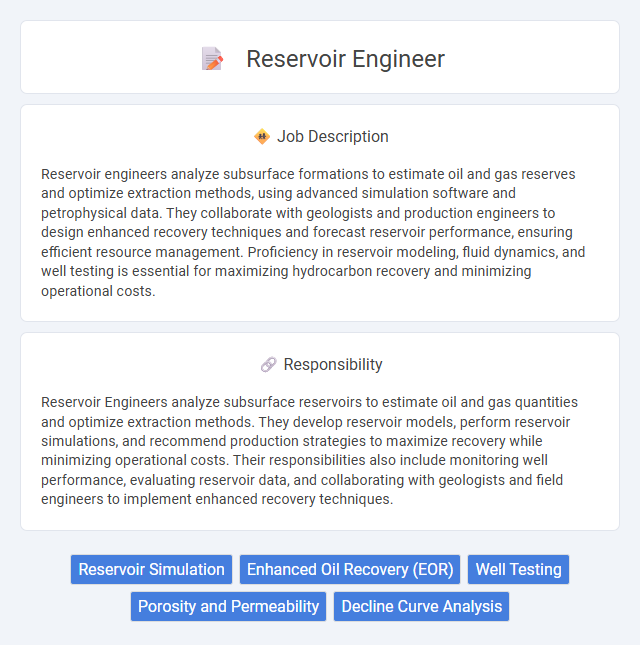
Reservoir engineers analyze subsurface formations to estimate oil and gas reserves and optimize extraction methods, using advanced simulation software and petrophysical data. They collaborate with geologists and production engineers to design enhanced recovery techniques and forecast reservoir performance, ensuring efficient resource management. Proficiency in reservoir modeling, fluid dynamics, and well testing is essential for maximizing hydrocarbon recovery and minimizing operational costs.
People with strong analytical skills and a passion for geology and fluid mechanics are likely to thrive as reservoir engineers. Those who enjoy problem-solving under uncertain conditions and can adapt to complex data modeling may find this job highly suitable. Individuals less comfortable with detailed technical analysis or dynamic teamwork might face challenges in this role.
Qualification
Reservoir engineers require a strong foundation in petroleum engineering or a related field, typically holding a bachelor's degree, with many positions preferring a master's degree for advanced technical expertise. Proficiency in reservoir simulation software such as Petrel, Eclipse, or CMG is essential for modeling fluid flow and optimizing hydrocarbon recovery. In-depth knowledge of geology, fluid mechanics, and enhanced oil recovery techniques, combined with strong analytical and problem-solving skills, are critical qualifications for success in this role.
Responsibility
Reservoir Engineers analyze subsurface reservoirs to estimate oil and gas quantities and optimize extraction methods. They develop reservoir models, perform reservoir simulations, and recommend production strategies to maximize recovery while minimizing operational costs. Their responsibilities also include monitoring well performance, evaluating reservoir data, and collaborating with geologists and field engineers to implement enhanced recovery techniques.
Benefit
A Reservoir Engineer is likely to receive competitive salaries and benefits due to the specialized skills required in optimizing oil and gas extraction. The role probably offers opportunities for career advancement and professional development within the energy sector. Job stability and incentives such as bonuses or profit-sharing may be common, reflecting the critical impact of reservoir performance on company revenue.
Challenge
A Reservoir Engineer likely faces the challenge of accurately predicting fluid behavior within complex underground reservoirs to optimize hydrocarbon recovery. They probably need to integrate geological, petrophysical, and engineering data amidst uncertainties to develop efficient extraction strategies. Managing reservoir performance under varying economic and technological constraints could present ongoing difficulties.
Career Advancement
Reservoir engineers play a critical role in evaluating oil and gas reservoirs to optimize production and maximize recovery, leveraging advanced simulation software and geological data analysis. Career advancement opportunities include moving into senior technical roles, management positions such as project lead or reservoir management, and specialization in enhanced oil recovery techniques or digital oilfield technologies. Continuous professional development, industry certifications like SPE Reservoir Engineering Certification, and gaining experience in diverse reservoir types significantly enhance prospects for upward mobility within energy companies.
Key Terms
Reservoir Simulation
Reservoir engineers specializing in reservoir simulation use advanced software to model fluid flow within subsurface hydrocarbon reservoirs, optimizing extraction strategies and enhancing recovery rates. They analyze geological and petrophysical data to predict reservoir performance under varying production scenarios. Expertise in numerical modeling techniques and simulation tools like Eclipse or CMG is crucial for accurate forecasting and decision-making in reservoir management.
Enhanced Oil Recovery (EOR)
Reservoir engineers specializing in Enhanced Oil Recovery (EOR) utilize advanced techniques such as thermal recovery, gas injection, and chemical flooding to maximize hydrocarbon extraction from mature fields. They analyze reservoir properties and fluid behaviors to design and implement EOR methods that increase oil recovery beyond primary and secondary processes. Expertise in reservoir simulation software and petrophysical data interpretation is essential for optimizing EOR strategies and improving field development economics.
Well Testing
Reservoir engineers specializing in well testing analyze pressure and flow data to evaluate reservoir performance and optimize hydrocarbon recovery. They design and conduct well tests to determine reservoir properties such as permeability, porosity, and fluid saturation. Expertise in interpreting well test results aids in making informed decisions for reservoir management and production strategies.
Porosity and Permeability
Reservoir engineers analyze porosity and permeability to evaluate the storage capacity and fluid flow within subsurface rock formations, directly impacting hydrocarbon recovery efficiency. High porosity indicates abundant void spaces for oil and gas accumulation, while permeability governs the ease with which fluids migrate through the reservoir matrix. Precise assessment of these petrophysical properties supports optimal well placement and enhanced recovery strategies essential for maximizing reservoir performance.
Decline Curve Analysis
Reservoir engineers use Decline Curve Analysis (DCA) to forecast future oil and gas production by analyzing historical production data. DCA involves fitting production rate data to mathematical models such as exponential, hyperbolic, or harmonic declines to estimate reserves and optimize recovery strategies. Mastery of software tools like ARIES and MBAL enhances the accuracy of decline curve forecasting and reservoir performance evaluation.
 kuljobs.com
kuljobs.com